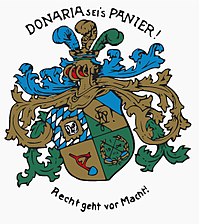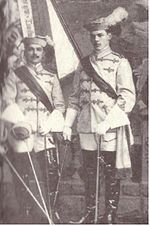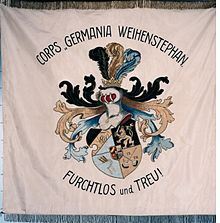Corps Donaria zu Freising-Weihenstephan
| Corps Donaria zu Freising-Weihenstephan | ||||||
|---|---|---|---|---|---|---|
University |
||||||
Establishment date |
December 1, 1900 in Freising
|
|||||
Seniors' Convent |
||||||
Umbrella organization |
none
|
|||||
Motto |
Right comes before power!
|
|||||
Corps boy band |
|
|||||
Fox band |
|
|||||
Circle |
||||||
Website |
||||||
The Corps Donaria is an association-free, mandatory corps in Freising . Today it is the only remaining corps at the University of Freising and one of two mandatory student associations on site . It brings together students and alumni from the Technical University of Munich , the Ludwig Maximilians University of Munich , the universities of Munich and Weihenstephan-Triesdorf and the University of Landshut . The members are called "Donaren". The temporary life corps is a member of the Munich Seniors' Convention .
General
The name "Donaria" is derived from the Germanic god Donar , who is considered the patron god of farmers. The colors used are light blue-gold-forest green with golden percussion. The corps boys wear the three-colored ribbon , the foxes the two-colored light blue-gold fox ribbon also provided with golden percussion. In addition, a light blue cap is worn as the back of the head. The pekesche is also light blue. Originally established as an agricultural association, the colors are related to agriculture. Light blue stands for the sky, gold for the sun and forest green for the seed fields.
The coat of arms is divided into four different motifs, in addition to the date of foundation heraldic at the bottom left and the colors and the compass heraldic at the top left, a red plow with a blue mouldboard is shown at the bottom right. Weihenstephan's coat of arms is shown heraldically in the upper right corner. The motto is: "Law comes before power!"
The Corps Donaria is part of the Munich Seniors' Convention.
history
Time until the Weimar Republic
Today's corps was founded on December 1, 1900 as an Academic-Scientific Association (AWV) and was thus still a loose association of students of agriculture who were looking for an exchange with one another. After the Corps Agronomia moved to Munich (1903), the AWV was the only point of contact for students of agricultural subjects in Freising. In 1904 it changed into a student union under the name Akademisch-Landwirtschaftlicher Verein Weihenstephan (ALV) and adopted the colors, circles, motto and coat of arms that are still used today. In 1906 the previously exempted scale length became mandatory. At the same time, Donaria accepted the principle of unconditional satisfaction . Before the Second World War, every active player had to play eight compulsory games. 1908 was first publicly worn and presented as a connection. When it came to elevating the Weihenstephan Academy to a university, Donaria was appointed spokeswoman for all local agricultural students by the Ministry of Culture in the same year. At that time, a 2/3 majority was able to make a decisive decision on July 7, 1908. From now on Donaria had to report every six months on events, scientific successes of the academy and the progress of the negotiations. Today these can be found in the convent books. One of the founding philistines at the time, Friedrich Endress, had a significant influence on the appointment to the university. During the First World War 40 of the 131 soldiers in the Corps remained on the field or are missing. The entire active operation ceased in 1916.
In 1920, at the same time as Weihenstephan was elevated to a university, it was converted to a corps. A race launch at the Rudolstadt Senior Citizens' Convention can be found in the convention books of the time . In this decade there were, in addition to Donaria in Freising, the striking connections Corps Agraria and from 1922 the Corps Germania, as well as the Academic Brewers Association Bavaria (today's Landsmannschaft Bavaria) and the connection Landfrankonia. In 1922 Donaria joined the Naumburg Deputy Convent (NDC). This was later renamed the Naumburg Senior Citizens' Convention . This should remain the only umbrella organization in which the Corps was a member.
Corps Germania
In the winter semester of 1921/22 the corps had over 70 inactive corps boys. 15 corps boys took this as an opportunity to split off and on December 1, 1922 to found the Corps Germania Weihenstephan (colors black-gold-light blue; motto: Fearless and loyal). Donaria and Germania have maintained lively contacts since then, contested measure lengths with each other and belonged to the same umbrella organization. In 1927 the connection Landfrankonia (colors: black-gold-carmin red; motto: Faithful German forever - honor, freedom, fatherland) was included in the Corps Germania. A year later it was suspended and in 1929 it became part of its mother association. The flag of both compounds is owned by Donariae. The tradition of the Corps Germania is maintained and cultivated to this day.
Younger story
In 1930 the Corps gave up the faculty principle. Those wishing to join were no longer only recruited among agricultural students, but could become members regardless of their subject. In 1934 the corps was suspended due to the political situation. As with many other corps in Germany, the principles of a corps were not compatible with the National Socialist ideology, and in 1937 the Association of Alter Herren followed. One operation was still secretly continued. 34 Donars lost their lives in the Second World War.
First re-established as Club Donaria in 1947, the Corps Donaria was reconstituted in 1951, making the student union mandatory again. To date, every Donare must have fought at least three lengths.
With the renoncation at the Munich Senior Citizens' Convention in 1953 and acceptance in 1955, Donaria became the only non-association corps in a SC, and accordingly the corps are also granted many special rights. In 1964 the Association of Old Men acquired a house at Landshuter Strasse 17. This was now to become the home of the Corps. Nationwide, Donaria is the only free mandatory corps and has long been a life corps . Due to the special status of freedom of association and with the abandonment of the principle of a life corps, there are multiband people in both German umbrella organizations. The active and old men maintain contact with the corps of the KSCV and the Weinheim Senior Citizens' Convention . In addition, the Corps Donaria was granted a seat at both association meetings until 2011. There are no cartels, introductory relationships or formal friendship relationships with other corps. But there has been a friendship with the Corps Germania Hohenheim for around 50 years .
In 1997 the Corps moved into its newly built house in Freising-Neustift . At the same time, the Xaverienthal estate was given up. The 100th foundation festival was celebrated three years later. The Süddeutsche Zeitung reported in an article in 2009 about the scale fencing at Donaria and the reservations of other students against this custom . Donaria currently has 111 old men and 24 active (corps boys, inactive corps boys and foxes).
The special status of the diploma master brewer
Renoncation at the Weinheim Seniors Convent and the Kösener Seniors Convents Association failed due to the unclear academic degree of the "Diplom-Braumeister" degree from the Technical University of Munich. As a course of study, this was also accessible to students without a university entrance qualification . This means that graduates from a specialist academy for brewing and beverage technology can immediately begin their specialist studies (3rd semester) in Weihenstephan. This means that brewery companies without a high school diploma are allowed to study as well as new students with a high school diploma. A large proportion of the members of the corps are made up of this degree program. This is special for corps across Germany.
Well-known Donaren
- Ludwig Steuert (1853–1907), EM, professor of anatomy, physiology and animal breeding at the Königl. Bavarian Academy for Agriculture in Weihenstephan
- Thomas Scharnagel (1880–1953), plant breeder
- Wilhelm Zorn (1884–1968), animal and agricultural scientist
- Ernst Rattenhuber (1887–1951), politician, Minister of Agriculture of Bavaria, founding member of the CSU
- Ludwig Detzel (1888–1916), vine breeder
- Hanns Kreutz (1892–1952), crop scientist
- Joseph Maria Lutz (1893–1972), writer and local poet
- Theo Pfeuffer (1909–1987), farmer, plant breeder and politician
- Alfred-Ernst Prinz ("Prince") of Löwenstein-Wertheim-Freudenberg (1924–2010), from 1980 head of the House of Löwenstein-Wertheim-Freudenberg
- Bernhard Diether Ritter von Wüllerstorff and Urbair (1933–2014), animal scientist, author and member of the European Parliament for the agriculture of specialty crops
- Just-Hinrich von Rümker (1935–1999), plant breeder, author and honorary member of the DLG
- Günther Kollmar (1937–2013), entrepreneur ( Oettinger Brewery )
- Theodor Häußler (* 1941), farmer and winemaker, author of books on the Baierwein growing region , sugar production in the Upper Palatinate, potato production in the Upper Palatinate and silk production in Bavaria ( "Bavarian Silk" )
- Dirk Kollmar (1963–2014), entrepreneur, children's book author, sports official, recipient of the Federal Cross of Merit
literature
- Bavarian State Parliament: Negotiations 1919–1933: 12th session of October 1920, page 395 ff.
- Bavarian State Parliament: Negotiations 1919–1933: 31st public session in December 1919
- Bavarian agricultural yearbook. 55th year, special issue p. 97. BLV Verlagsgesellschaft, Munich 1978 (list of all student associations in Freising with founding dates)
- Comment from the Munich Seniors' Convent, status 6/2014, 4th revision
- Corps Donaria Freising-Weihenstephan: Chronicle of a hundred-year student union 1900–2000 . Verb. Alter Herren des Corps Donaria e. V., 2000
- Paulgerhard Gladen : History of the student corporation associations , Volume 1. Würzburg 1981, pp. 225, 227
- Ernst-Günter Glienke: Civis Academicus 2005/2006. Handbook of the German, Austrian and Swiss corporations and student associations at universities and colleges . SH-Verlag, Cologne 2004, ISBN 3-89498-149-0
- Kim Björn Becker: Student associations in Freising In: Süddeutsche Zeitung No. 238, October 15, 2013, pp. R10 – R11
- Erich Stahleder: 175 years of teaching and research in Weihenstephan, historical lecture 1979 . Bavarian Agricultural Yearbook 56th volume, special issue 1. BLV Verlagsgesellschaft, Munich 1979
Web links
- Homepage of the Corps Donaria
- Report on Dirk Kollmar's funeral
- Information about student associations in Freising
Individual evidence
- ^ Civis Academicus 2005/2006. Handbook of the German, Austrian and Swiss corporations and student associations at universities and colleges, p. 97
- ↑ MSC website
- ^ EH Eberhard: Handbook of the student liaison system. Leipzig, 1924/25, p. 159.
- ↑ Convent Book of July 1908
- ^ Deutsche Corpszeitung, Edition 2/2014, pages 16 and 17
- ↑ Kim Björn Becker: Student connections in Freising In: Süddeutsche Zeitung No. 238, October 15, 2013, pp. R10 – R11 (supplement on studying in Weihenstephan and the connections there) to be found on the Corps website
- ^ Comment from the Munich Seniors' Convention
- ↑ Deutsche Corpszeitung, issue 2/2015, supplement reports
- ↑ Karin Prummer: More verbal battles than scales. Because the Donaren are a powerful alliance, they have to constantly fight for their reputation in public. In Süddeutsche Zeitung of September 17th, 2009 ( page no longer available , search in web archives ) Info: The link was automatically marked as defective. Please check the link according to the instructions and then remove this notice.
- ↑ https://portal.mytum.de/studium/studiengaenge/brauwesen_diplom
- ↑ NordOstMagazin 2008
- ↑ Portrait in the Fränkische Nachrichten 2009 on the Donarias website
- ^ Farewell to brewery boss Dirk Kollmar. In: gotha.thueringer-allgemeine.de. Retrieved September 13, 2015 .





